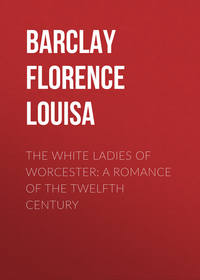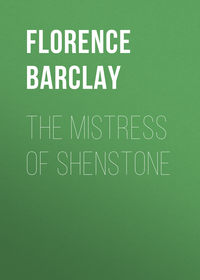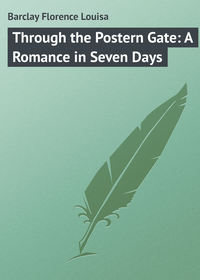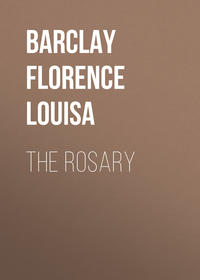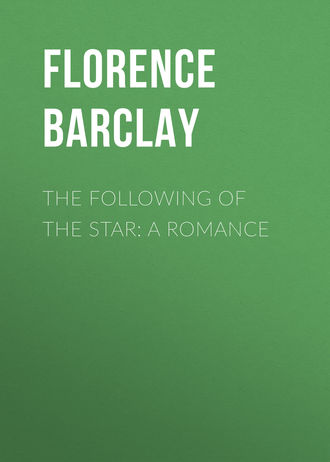 полная версия
полная версияThe Following of the Star: A Romance
But, when he began to preach, he arrested her attention. His opening remark evidently appealed to her. She glanced up at him, quickly, a gleam of amusement and interest in her clear eyes. And afterwards, though she did not lift them again, and partly turned away, leaning against the pillar, so that he could see only the clear-cut whiteness of her perfect profile, he knew that she was listening.
From that hour, David's evening sermons were prepared with the more or less conscious idea of reaching the soul of that calm immovable Lady of Mystery.
She did not attract him as a woman. Her beauty meant nothing to him. He had long ago faced the fact that his call to Central Africa must mean celibacy. No man worthy of the name would, for his own comfort or delight, allow a woman to share such dangers and privations as those through which he had to pass. And, if five years of that climate had undermined his own magnificent constitution and sent him home a wreck of his former self, surely, had he taken out a wife, it would simply have meant a lonely grave, left behind in the African jungle.
So David had faced it out that a missionary's life, in a place where wife and children could not live, must mean celibacy; nor had he the smallest intention of ever swerving from that decision. His devotion to his work filled his heart. His people were his children.
Therefore no ordinary element of romance entered into his thoughts concerning the beautiful woman who, on each Sunday evening, leaned against the stone pillar, and showed by a slight flicker of the eyelids or curve of the proud lips, that she heard and appreciated each point in his sermon.
How far she agreed, he had no means of knowing. Who she was, and whence she came, he did not attempt to find out. He preferred that she should remain the Lady of Mystery. After her first appearance, when old Jabez bustled into the vestry at the close of the service, he abounded in nods and winks, inarticulate exclamations, and chuckings of his thumb over his shoulder backward toward the church. At length, getting no response from David, he burst forth: "Sakes alive, sir! I'm thinking she ain't bin seen in a place o' wash-up, since she was – "
David, half in and half out of his cassock, turned on the old clerk in sudden indignation.
"Bones," he said, sternly, "no member of the congregation should ever be discussed in the vestry. Not another word, please. Now give me the entry book."
The old man muttered something inaudible about the Rector and young hupstarts, and our poor David had made another enemy in Brambledene.
He never chanced to see his Lady of Mystery arrive; but, after that first evening, she never failed to be in her place when he came out of the vestry; nor did he ever see her depart, always resisting the temptation to leave the church hurriedly when service was over.
So she remained the Lady of Mystery; and now – his last Sunday evening had come; and, as he thought of her, he longed to see a look of faith and joy dawn in her cold sad eyes, as ardently as another man might have longed to see a look of love for himself awaken in them.
But David wanted nothing for himself, and a great deal for his Lord. He wanted this beautiful personality, this forceful character, this strong, self-reliant soul; he wanted this obvious wealth, this unmistakable possessor of place and power, for his Master's service, for the Kingdom of his King. No thought of himself came in at all. How should it? He wanted to win her for her own sake; and he wanted to win her for his Lord. He wanted this more persistently and ardently than he had ever desired anything in his life before. He was almost perplexed at the insistence of the thought, and the way in which it never left him.
And now – the last chance had come.
He rose, and went to the window. Snowflakes were falling gently, few and far between; but the landscape was completely covered by a pure white pall.
"Undoubtedly," said David, "my Lady of Mystery will be there, unless this fall of snow keeps her away."
He paced up and down the study, repeating stray sentences from his sermon, as they came into his mind.
Sarah brought in the lamp, and drew the maroon rep curtains, shutting out the snow and gathering darkness; Sarah, stout, comfortable, and motherly, who – accustomed to the rosy-cheeked plumpness of her easy-going master – looked with undisguised dismay at David's thin worn face, and limbs on which his clothes still hung loosely, giving him an appearance of not belonging to his surroundings, which tried the kind heart and practical mind of the Rector's good housekeeper.
"He do give me the creeps, poor young gentleman," she confided to a friend, who had dropped in for tea and a chat. "To see him all shrunk up, so to speak, in Master's big chair; and just where there would be so much of Master, there's naught of him, which makes the chair seem fair empty. And then he looks up and speaks, and his voice is like music, and his eyes shine like stars, and he seems more alive than Master, or anybody else one knows; yet not alive in his poor thin body; but alive because of something burning and shining hinside of 'im; something stronger than a body, and more alive than life – oh, I don't know!" concluded Sarah, suddenly alarmed by her own eloquence.
"Creepy, I call it," said the friend.
"Creepy it is," agreed Sarah.
Nevertheless she watched carefully over David's creature comforts, and he owed it to Sarah's insistence, that he weighed nearly a stone heavier when he left Brambledene than on his arrival there.
She now brought in tea, temptingly arranged on a tray, poured out his first cup, and stood a minute to watch him drink it, and to exhort him to wrap up well, before going out in this snow.
"My last Sunday, Sarah," said David, looking at her with those same deep-set shining eyes. "I sha'n't bother you much longer. I have a service to-morrow – Christmas-day; and must stay over Boxing-day for two weddings. Then I'm off to town; and in a couple of weeks I sail for Central Africa. I wonder how you would like Africa, Sarah. Are you afraid of snakes?"
"Don't mention 'em, Mr. Rivers, sir," replied Sarah, in a stage whisper; "nasty evil things! If Eve had been as fearful of 'em as I am, there'd never 'ave been no Fall. You wouldn't catch me staying to talk theology with a serpent. No, not me, sir! It's take to m' heels and run, would have been my way, if I'd 'a lived in Genesis three."
David smiled. "A good way, Sarah," he said, "and scriptural. But you forget the attraction of the tree, with its luscious fruit. Poor Eve! The longing of the moment, always seems the great essential. We are apt to forget the long eternity of regret."
Sarah sidled respectfully towards the door.
"Eat your hot-buttered toast, before it grows cold, sir," she counselled; "and give over thinking about snakes. Dear heart, it's Christmas-eve!"
"So it is," said David. "And my sermon is about a star. Right you are, Sarah! I'll 'give over thinking about snakes,' and look higher. There can be no following of the star with our eyes turned earthward… All right! Don't you worry. I'll eat every bit."
CHAPTER III
DAVID STIRS THE STILL WATERS
As David tramped to church the moon was rising. The fir trees stood, dark and stately, beneath their nodding plumes of feathery snow. The little village church, with its white roof, and brightly lighted windows, looked like a Christmas card.
Above its ivy-covered tower, luminous as a lamp in the deep purple sky, shone out one brilliant star.
David smiled as he raised his eyes. He was thinking of Sarah and the snakes. "'If I had lived in Genesis three,'" he quoted. "What a delightful way of putting it; as if Genesis were a terrace, and three the number. Good old Sarah! Would she have been more successful in coping with the tempter? Undoubtedly Eve had the artistic temperament, which is always a snare; also she had a woman's instinctive desire to set others right, and to explain. Adam would have seen through the tempter's wilful distortion of the wording of God's command, and would not have been beguiled into an argument with so crafty and insincere an opponent. Poor Eve, in her desire to prove him wrong, to air her own superior knowledge, and to justify her Maker, hurried at once into the trap, and was speedily undone. Here, at the very outset of our history, we have in a nutshell the whole difference between the mentality of the sexes. Where Eve stood arguing and explaining, – laying herself open to a retort which shook her own belief, and undermined her obedience, – Adam would have said: "Liar!" and turned on his heel. Yet if Eve lived nowadays she would be quite sure she could set right all mistakes in our legislature, if only Adam could be induced to let her have a finger in every pie. Having lived in Genesis iii., Adam would know better than to try it!"
As David reached the old lich-gate, two brilliant lights shone down the road from the opposite direction, and the next moment a motor glided swiftly to the gate, and stopped.
A footman sprang down from beside the chauffeur, opened the door, touched a button, and the interior of the car flashed into light.
Seated within, half buried in furs, David saw the calm sweet face of his Lady of Mystery. He stood on one side, in the shadow of the gate, and waited.
The footman drew out a white fur rug, and threw it over his left arm; then held the door wide.
She stepped out, tall and silent. David saw the calm whiteness of her features in the moonlight. She took no more notice of her men, than if they had been machines, but passed straight up the churchyard path, between the yew-tree sentinels, and disappeared into the porch.
The footman bundled in the rug, switched off the lights, banged the door, took his place beside the chauffeur, and the large roomy motor glided silently away. Nothing remained save a delicate fragrance of violets under the lich-gate, beneath which she had passed.
The whole thing had taken twenty seconds. It seemed to David like the swift happenings of a dream. Nothing was left, to prove its reality, but the elusive scent of violets, and the marks of the huge tyres in the snow.
But as David made his way round to the vestry door, he knew his Lady of Mystery was already in her corner beside the stout whitewashed pillar; and he also knew that he had been right, in the surmise which placed her in an environment of luxury and wealth.
Christmas-eve had produced a larger congregation than usual. The service was as cheerful and noisy as the choir and organist could make it. David's quiet voice seemed only to be heard at rare intervals, like the singing of a thrush in the momentary lull of a storm.
The Lady of Mystery looked alternately bored and amused. Her expression was more calmly critical than ever. She had discarded her large velvet hat for a soft toque of silver-grey fur, placed lightly upon her wealth of golden hair. This tended to reveal the classic beauty of her features, yet made her look older, showing up a hardness of expression which had been softened by the green velvet brim. David, who had thought her twenty-five, now began to wonder whether she were not older than himself. Her expression might have credited her with full thirty years' experience of the world.
David mounted the pulpit steps to the inspiriting strains of "While shepherds watched their flocks by night, all seated on the ground." Already the inhabitants of Brambledene had had it at their front doors, sung, in season and out of season, by the school-children, in every sort of key and tempo. Now the latter returned joyfully to the charge, sure of arriving at the final verse, without any sudden or violent exhortations to go away. They beat the choir's already rapid rendering; ignored the organist, and rushed on without pause, comma, or breathing space.
In the midst of this erratic description of the peaceful scene on Bethlehem's hills on that Christmas night so long ago, David's white earnest face appeared in the pulpit, looking down anxiously upon his congregation.
The words of his opening collect brought a sense of peace, though the silence of his long intentional pause after "Let us pray," had at first accentuated the remembrance of the hubbub which had preceded it. David felt that the weird chanting of his African savages, echoing among the trees of their primeval forests, compared favourably, from the point of view both of reverence and of music, with the singing in this English village church. His very soul was jarred. His nerves were all on edge.
As he stood silent, while the congregation settled into their seats, looking down he met the grey eyes of his Lady of Mystery. They said: "I am waiting. I have come for this."
Instantly the sense of inspiration filled him.
With glad assurance he gave out his text. "The gospel according to St. Matthew, the second chapter, the tenth and eleventh verses; 'When they saw the star, they rejoiced with exceeding great joy… And when they had opened their treasures, they presented unto Him gifts; gold, and frankincense, and myrrh.'"
As soon as the text of a sermon was given out, Mr. Churchwarden Jones in his corner, and Mr. Churchwarden Smith in his, verified it in their Bibles, made sure it was really there, and had been read correctly. Then they closed their Bibles and placed them on the ledges in front of them; took off their glasses, put them noisily into spectacle-cases, stowed these in inner pockets, leant well back, and proceeded to go very unmistakably and emphatically to sleep.
David had got into the way of reading his text twice over, slowly, while this performance took place.
Now, when he looked up from his Bible, the two churchwardens were in position. Their gold watch-chains, looped upon their ample waistcoats, produced much the same effect as the wreathing with which well-meaning decorators had accentuated the stoutness of the whitewashed pillars.
The attention of the congregation was already wandering. David made a desperate effort to hold it.
"My friends," he said, "although it is Christmas-eve, I speak to you to-night on the Epiphany subject, because, when the great Feast of Epiphany comes, I shall no longer have the privilege of addressing you. I expect to be on the ocean, on my way to carry the Christmas message of 'Peace on earth, good will toward men,' to the savage tribes of Central Africa."
No one looked responsive. No one seemed to care in the least where David Rivers would be on the great Feast of Epiphany. He tried another tack.
"Our text deals with the experience of those Wise Men of the East, who, guided by the star, journeyed over the desert in quest of the new-born King. Now, if I were to ask this congregation to tell me how many Wise Men there were, I wonder which of you would answer 'three.'"
No one looked in the least interested. What a silly question! What a senseless cause for wonder! Of course they would all answer "three." The youngest infant in the Sunday-school knew that there were three Wise Men.
"But why should you say 'three'?" continued David. "We are not told in the Bible how many Wise Men there were. Look and see."
The Smith and Jones families made no move. They knew perfectly well that their Bibles said "three." If this young man's Bible omitted to mention the orthodox number, it was only another of many omissions in his new-fangled Bible and unsound preaching. It would be one thing more to report to the Rector, on his return.
But his Lady of Mystery leaned forward, took up a Bible which chanced to be beside her, turned rapidly to Matthew ii., bent over it for a moment, then smiled, and laid it down. David knew she had made sure of finding "three," and had not found it. He took courage. She was interested.
He launched into his subject. In vivid words, more full of poetry and beauty than he knew, he rapidly painted the scene; the long journey through the eastern desert, with eyes upon the star; the anxious days, when it could not be seen, and the route might so easily be missed; the glad nights when it shone again, luminous, serene, still moving on before. The arrival at Jerusalem, the onward quest to Bethlehem, the finding of the King.
Then, the actual story fully dealt with, David turned to application.
"My friends," he said, "this earthly life of ours is the desert. Your pilgrimage lies across its ofttimes dreary wastes. But if your journey is to be to any purpose, if life is to be a success and not a failure, its main object must be the finding of the King. His guiding Spirit moves before you as the star. His word is also the heavenly lamp which lights your way. But I want, to-night, to give you a third meaning for the Epiphany star. The star stands for your highest Ideal. Pause a moment, and think… Have you in your life to-night a heaven-sent Ideal, to which you are always true; which you follow faithfully, and which, as you follow it, leads to the King?"
David paused. Mrs. Jones rustled, and Mrs. Smith tinkled, but David heard them not. The Lady of Mystery had lifted her eyes to his, and those beautiful sad eyes said: "I had."
"They lost sight of the star," said David. "Their hearts were sad, thinking they had lost it forever. But they found it again at Jerusalem – place of God's holy temple and worship. Here – is your Jerusalem. Lift your eyes to-night, higher than the mere church roof, and find again your lost star; see where shines your Ideal – your faith, your hope, your love, your belief in things eternal. 'And when they saw the star they rejoiced.'"
David paused.
Long lashes veiled the grey eyes. Her hands were folded in her lap, and her eyes were not lifted from them.
"When these desert-travellers found the King," continued David, "they opened their treasures and presented unto Him gifts, – gold, and frankincense, and myrrh. I know this is usually taken in relation to Himself, and as being, in a threefold way, typical of His mission: Gold for the King; frankincense for the great High Priest; myrrh for the suffering, dying Saviour, who was to give His life for the redemption of the world.
"But I want to take it to-night in another sense. Let these three kinds of gifts emphasise the three kinds of things you have in your life to-day, which you may offer to the King, if your guiding star has led you to His feet. They opened their treasures. I want you to open your treasures, to-night. What are your treasures? Why yourself, and all you possess.
"First let us consider the gold."
The Lady of Mystery lifted her golden head and looked him full in the face. There was challenge in her eyes.
"I do not necessarily mean your money," said David, "though how much more you might all do with that, for the King and for His service, than you are already doing. Ah, if people could realise how greatly gold is needed for His work, they would soon open their treasures and pour it forth! I have told you of my vast parish, out in the unexplored forests, swamps, and jungles of Central Africa. Do you know what I want for my people, there? Think of all you have here – of all you have had, ever since you can remember. Then listen: I want a church; I want schools; I want books; I want a translation of the Bible, and a printing-press to print it with." David's eyes glowed, and he threw grammar to the winds! "I want a comrade to help me, and a steam-launch with which to navigate great lakes and rivers. I want all these things, and I want them for my Master, and for His work. I can give my own life, but it is all I have to give. I have been taking your Rector's place here for six weeks in order to earn twelve guineas, which will enable me to take out a good medicine-chest with which to doctor my people, and to complete my necessary outfit."
Mr. Churchwarden Jones was awake by now, and fidgeted uncomfortably. This young man should not have mentioned his stipend, from the pulpit. It was decidedly unsuitable.
"Your Rector," continued David, "knowing why I need it, is generously doubling that payment. May God bless him for it, when he takes up again his ministry among you."
They were all listening now. David's eyes glowed like hot coals in his thin face. His voice rang through the church.
"Ah, friends," he said, "those who have all they need for their comfortable spiritual life, cannot realise the awful, desperate want, in those wild places of the earth. We enjoy quoting what we call a 'gospel text': 'Whosoever shall call upon the name of the Lord shall be saved.' But too often we pause there, in self-appropriating complacency, forgetting that the whole point of the passage lies in what follows: 'How then shall they call on Him in Whom they have not believed? And how shall they believe in Him of Whom they have not heard? And how shall they hear, without a preacher? And how shall they preach except they be sent?' You must answer all these questions, when you open your treasures at the feet of the King.
"But forgive me for intruding my own interests. This is not a missionary sermon." – Here Mrs. Smith nodded, energetically. That was exactly what she had already whispered to Mr. Smith. – "Also 'gold' stands for much besides money. Think of all the golden things in life. The joys, the brightness, the glory of success; all beauty, all gaiety, all golden mirth and laughter. Let all these golden things be so consecrated that, opening your treasures, you can at any moment bring them as offerings to your King.
"But the second gift was frankincense." David paused, giving each listener – and at last there were many – time to wonder what in his or her life stood for frankincense.
"Frankincense," said David, "is, first of all, your worship. And by worship, I do not necessarily mean public worship in church, important though that be. I mean the constant worship of an adoring heart. 'O worship the Lord in the beauty of holiness.' Unless your daily life from Monday to Saturday is a life of worship, there will not be much reality in your public worship on Sunday. And then, frankincense stands for all that appertains to the spirit part of you – your ideals, your noblest loves, your finest aspirations. Open your treasures, friends, and bring these to your King.
"And, lastly, myrrh." David paused, and a look so calm, so holy, so sublime, passed into his face, that to one who watched him then, and who chanced to know the meaning of that look, his face was as the face of an angel.
"The myrrh," he said, "stands for death. Some of us may be called upon definitely to face death, for the King's sake. But all who have lived unto Him in life, can glorify Him in death. 'Precious in the sight of the Lord is the death of His saints.' We can all at last bring to Him this gift – a gift which, in the bringing, will indeed bring us into His very presence. But, meanwhile, your present offering of myrrh is the death of self; the daily crucifying of the self-life. 'For the love of Christ constraineth us; because we thus judge, that if one died for all, then were all dead; and that He died for all, that they which live should not henceforth live unto themselves, but unto Him, Who died for them, and rose again.' Your response to that constraining love, your acceptance of that atoning death, your acquiesence in that crucifixion of self, constitute your offering of myrrh.
"But myrrh, in the Bible, stands for other things besides death. We must not pause to do so now, but sometime, at your leisure, look out each mention of myrrh. You will find it stands for love – love of the sweetest, tenderest kind; love so complete, that it must bring with it self-abnegation, and a mingling of pain with its bliss.
"And you will find it stands for sorrow; not bitterness of woe; but sorrow accepted as the Father's will, and therefore touched with reverent joy. Ah, bring your sorrows as gifts to your King. 'Surely He hath borne our griefs, and carried our sorrows.' Bring even these, and lay them at His feet."
David closed his Bible, placing it on the cushion, folded his hands upon it, and leaned down from the high pulpit.
"My friends," he said, – and those who looked up responsive never forgot the light in his eyes – "I am leaving this dear home land of ours on the day when we shall be keeping the Feast of the Star. My star leads me to a place from which I do not ever expect to return. My offering of myrrh to my King, is a grave in an African forest, and I offer it gladly.


